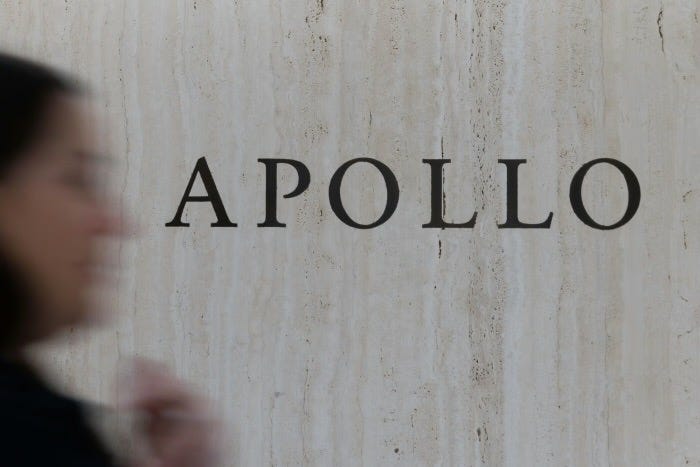Apollo Global Management: The Best Game in Town
There are many companies that claim, or have others claim for them, that they are “the next Berkshire Hathaway.” Most of the time, this comparison is hollow. It’s lazy, it’s thrown around too loosely, and it often completely misunderstands what made Berkshire special in the first place. Most of the time, it’s marketing.
But if there’s one company in today’s financial universe that actually deserves to be studied alongside Berkshire Hathaway, it’s Apollo Global Management.
And I don’t say this lightly. I don’t even like the whole concept of comparing a modern company to Warren Buffett’s empire. But if I had to, it wouldn’t be KKR, it wouldn’t be Blackstone, and it certainly wouldn’t be a tech startup talking about compounding. It would be Apollo.
And here’s why.
Athene: The Geico of Apollo—But Better
If you want to compare Apollo to Berkshire, the most important link is Athene. In Buffett’s model, Geico was the float engine. A source of low-cost capital, generated by insurance premiums that Berkshire could invest in equities and wholly owned businesses. It was brilliant in the 1980s and 1990s. It gave Buffett his dry powder. It let him make moves when others were frozen.
Apollo has done something similar—but in a way that is, frankly, better suited for the next fifty years. Athene is Apollo’s float engine, but with major advantages.
First, Athene is not a traditional insurance company. It doesn’t insure cars or homes or even mortality. It offers retirement products. And that subtle difference matters. What Athene promises is guaranteed income at a later stage in life. It’s long-term, it’s contractual, and it’s relatively predictable. It’s not exposed to natural disasters or pandemics. It’s a simpler promise: guaranteed retirement income. And people want that. Especially aging populations across the developed world.
Second, the capital generated through Athene is more stable and far more scalable. It creates a predictable stream of assets that Apollo can deploy into long-duration credit investments. Unlike Geico, which had to reserve against losses and was exposed to underwriting cycles, Athene has a structural advantage: its liabilities are more spread out, more stable, and easier to hedge.
Third, Geico is outdated. It’s a coal-fired locomotive in an age of high-speed rail. Athene, on the other hand, is the high-speed rail. Built from scratch during and after the global financial crisis, it is natively digital, optimized for the modern capital markets environment, and deeply integrated into Apollo’s systems. And unlike Geico, Apollo didn’t just partner with Athene—it owns it outright.
KKR Executes Well, But They Don’t Have This Engine
Mark Rowan, Apollo’s CEO, has said publicly that KKR executes extremely well. That is not just a compliment, it’s a truth. KKR is a best-in-class firm. They’ve built a powerful business, they’re expanding globally, and they know what they’re doing. But here’s the hard truth: no matter how well they execute, they will never be able to replicate what Apollo has built with Athene.
This is not a product you can copy. You can’t just throw money at it. You can’t call Goldman and structure your way into this model. It had to be built from zero. And Apollo did it early. During the darkest days of the financial crisis, while other firms were licking their wounds, Apollo started constructing the foundation of what would become the most durable flywheel in modern finance.
Athene wasn’t bolted on. It wasn’t an experiment. It is embedded in the engine. And this is the key difference.
KKR still relies on the traditional private equity model: raise a fund, deploy it over several years, exit the deals, return capital, raise another fund. It is a good business, and it will continue to generate returns. But it is inherently cyclical. The nature of equity investing is farming. You plant, you harvest, and then you start again.
The difference is, Apollo doesn’t farm. It builds. If you want to understand why I believe Apollo is the most structurally superior business in global finance today, and why it is one of only two positions in my portfolio, read the full report by becoming a full member of the community.



